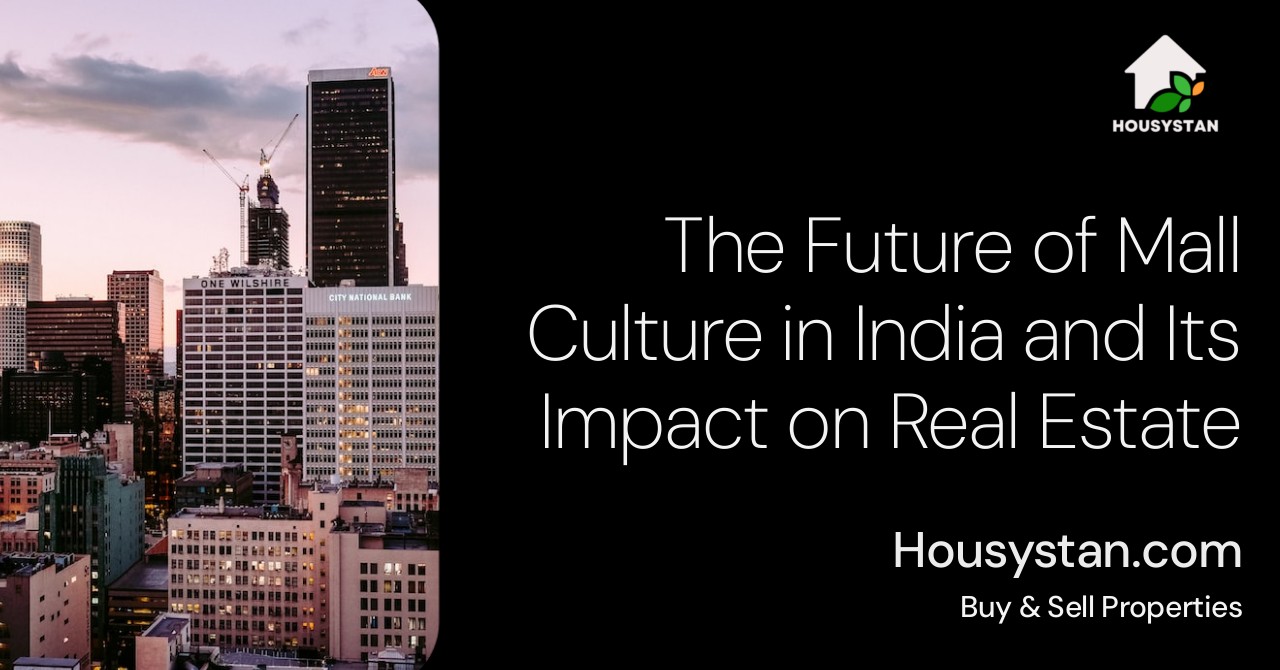The Future of Mall Culture in India and Its Impact on Real Estate
Read latest blogs and articles from Housystan

The Information mentioned here was last updated on:
29/1/2026The Future of Mall Culture in India and Its Impact on Real Estate
In recent years, the concept of mall culture has undergone significant transformations in India. Once perceived as mere shopping centers, malls are evolving into thriving hubs of entertainment, social interaction, and lifestyle activities. This evolution is reshaping the landscape of real estate in India, opening avenues for growth and innovation. In the following sections, we'll explore how mall culture is poised to transform and what this means for the real estate industry.
The Rise of Mall Culture in India
- Verified Tenants/Buyers
- Unlimited Property Listing
- Zero subscription/charges fee
Mall culture in India began to take shape in the early 2000s, paralleling economic growth and urbanization. As disposable incomes rose and aspirations broadened, malls became the go-to destinations for shopping, dining, and entertainment. Over the years, the number of malls in the country has grown exponentially, cementing their place in Indian urban life.
Malls as Lifestyle Destinations
Modern-day malls are no longer just retail spaces; they have transformed into lifestyle destinations that cater to varied consumer needs. They house multiplex cinemas, food courts, gaming zones, and spaces for concerts and events. This diversification aims to attract a larger audience by providing an all-encompassing experience, thereby increasing foot traffic and enhancing consumer engagement.
Integration of Technology
Technology plays a pivotal role in the evolution of mall culture. Features such as augmented reality (AR) apps offer interactive shopping experiences, while digital mapping and navigation tools help shoppers locate stores more efficiently. Online promotions and loyalty programs managed through mobile applications encourage repeat visits. Additionally, free Wi-Fi and digital payment options enhance the overall customer experience, making visits more convenient and enjoyable.
The Impact on Real Estate
The shift in mall culture significantly impacts real estate, influencing both commercial and residential sectors.
1. Commercial Real Estate Development
The demand for innovative retail space has driven commercial real estate developments. Developers are now prioritizing sustainability features, such as solar panels and energy-efficient buildings, to attract environmentally conscious businesses. The construction of mixed-use developments that integrate office spaces, hotels, and retail outlets is on the rise, offering convenience and maximizing land use.
2. Residential Real Estate Trends
Proximity to malls increases the attractiveness of residential properties, driving up their value. Malls serve as a key amenity for residential neighborhoods, offering accessibility to goods and services. Real estate developers often bank on the establishment of nearby malls to boost property sales and command higher prices for flats and homes.
Opportunities for Small Businesses
Malls have opened doors for small businesses and local brands to flourish. They provide a platform for smaller retailers to showcase their products alongside established brands. Pop-up shops and kiosks allow these businesses to test markets and build a customer base without the commitment of permanent spaces. Mall events and promotions serve as excellent tools for gaining visibility and attracting foot traffic.
Changes in Consumer Behavior
Indian consumers’ shopping habits are evolving, partly due to the increase in online shopping. However, malls provide a sensory experience that online platforms cannot replicate. The tangible aspects of shopping, such as trying on clothes or testing gadgets, are drawing consumers to physical stores. This factor ensures that malls remain relevant even in the digital age.
Green Initiatives and Sustainability
Sustainability is becoming a core focus in mall development, with green building certifications gaining popularity. Malls are incorporating eco-friendly practices, such as recycling, waste management systems, and rainwater harvesting. These initiatives not only reduce the environmental footprint but also attract consumers who prefer environmentally responsible businesses.
Impact of the COVID-19 Pandemic
The COVID-19 pandemic had a profound impact on malls, leading to temporary closures and a shift in how consumers shop. Malls are now increasingly focusing on hygiene and safety measures to reassure customers. Contactless payment and curbside pickup options have been implemented, adapting to the new normal. This adaptability is vital for their resilience in uncertain times.
The Role of Entertainment
Entertainment is increasingly being prioritized as a key attraction in malls. Given the growing demand for recreational activities, malls are creating diverse leisure options including amusement parks, virtual reality experiences, and fitness centers. By offering entertainment that caters to families and young adults, malls extend their appeal beyond retail.
Conclusion
The future of mall culture in India is dynamic and rich with potential. By embracing technology, sustainable practices, and entertainment, malls are positioning themselves as essential components of urban life. These developments have considerable implications for real estate, driving innovation and value in both commercial and residential sectors. As mall culture continues to evolve, it will be intriguing to observe how it further shapes the lifestyle and infrastructure within Indian cities.